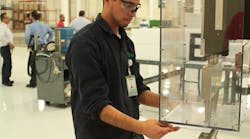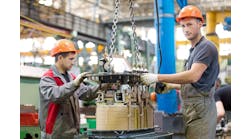ORBIS, a supplier of plastic reusable shipping containers and pallets, decided back in 2009 that they needed to do things differently to both attract and retain talent. The company knew it would be experiencing growth and wanted to have an edge when competing for talent. They decide that creating a culture of engagement would be the best course of action.
“At issue was how we should go about practicing certain behaviors,” says Dennis Rooney, vice president, human resources.
The company decided to create a set of behaviors which focused specifically on engaging leadership behaviors while deploying projects that improve efficiencies, reduces waste or saves costs. Called the LEAF program (Learning to Engage and Achieve on the Floor), it was created in 2011 to train a group of cross-functional salaried employees.
Central to this system are the three key behaviors;
- When there’s a problem, ask “WHY” did this happen” instead of “WHO” is responsible for this?
- Look for good behavior and comment on it.
- When you see negative behavior, become a coach, not a critic.
The success of the LEAF program led to the creation of the ROOTS program, which was applied to support and administrative roles such as IT, marketing, accounting and other disciplines.
ROOTS teams collaborated on projects such as defining design inputs within the new product development process, developing SAP training and education, and structuring new business development programs.
Both of these programs had to take into account the different perspectives of the workforce; older experienced workforce and the Millennials. The older workers, who are familiar with continuous improvement programs, consider LEAF and ROOT part of an evolution of these programs. In fact Rooney said that they often take the younger workers under their wing especially when it comes to quality and safety aspects.
Millenials desire to develop themselves . They want to make an impact on the organization with an eye towards becoming future leaders. “The tenants of the LEAF and ROOTS program, including being flexible and innovative does speak to the Millenials,” says Rooney.
Additionally the characteristics of these programs which gives employees a say in how things are done and how improvements can be made, is appealing to the younger workforce. In fact during the LEAF course employees are given the opportunity to develop a project and present it to the senior leadership, says Rooney.
More than 450 employees have graduated from these 12-week programs to date. The training consists of a combination of workshops, webinars and classroom sessions.
A 2013 survey showed that training such as ROOTS and LEAF have generated an uptick in employee engagement to 67%. Rooney points out that number is quite significant as the national average is 29%. This improvement has been important as the company has grown form 1,337 in 2010 to 1,916 in 2015.
“We have seen improvement in employee morale as a result of these programs,” says Rooney. In fact he says the mid-level leadership retention is above where the company expected. It is still working on improving hourly retention.
And its workplace success programs have been recognized. ”We’ve created an atmosphere of engagement at ORBIS that has not only helped employees make impactful improvements in their own personal professional development and the betterment of ORBIS, but has helped us be named a Top Workplace in Wisconsin two years running. To receive the award, employers are nominated by their own workers, “ says Rooney with regard to the award given by the Milwaukee Journal Sentinel, which is the largest media outlet in Wisconsin.
The success of the programs is that the behaviors become institutionalized at our company, Rooney points outs. "People recognize that the culture is different and therefore attractive. This is mission critical to us. Employees have a say, are heard and respected. LEAF and ROOTS emphasizes that. Respecting employees earns us respect as a company."



